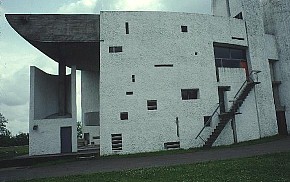2006.04.23 12:45
Steven Holl's building facades and urban patterns
There doesn't seem to be any denying that Holl looked at and continues to look at the historical precedent of Le Corbusier's Ronchamp. Architects don't like to reveal their inspirations, so the bullshit starts coming out instead. The bullshit is essential to keep the myth of creative genius alive.

"A lecturer of mine told me that Holl draws from the urban patterns of the site for the facade articulations of his buildings. Is this true? In any case, I don't see the justification. Can anyone shed some light on this?"
| |
2006.04.23 10:32
Steven Holl's building facades and urban patterns

You know, I always wondered what the urban pattern of Ronchamp was.
2006.04.04 12:51
Re: Constantine and Christians
It is perhaps wrong to say that Constantine was influenced by Helena and Eutropia when it came to Christianity, but there is no question that Constantine acted in tandem with Helena and Eutropia when it came to manifesting Christian churches. Helena's work is relatively well known here, but Eutropia's work is often ignored. Here is a letter from Constantine to Eusebius (as a bishop in Palestine), which Eusebius includes within the Life of Constantine after recording the death of Helena:
VICTOR CONSTANTINUS, MAXIMUS AUGUSTUS, to Macarius, and the rest of the bishops in Palestine.
One benefit, and that of no ordinary importance, has been conferred on us by my truly pious mother-in-law, in that she has made known to us by letter that abandoned folly of impious men which has hitherto escaped detection by you: so that the criminal conduct thus overlooked may now through our means obtain fitting correction and remedy, necessary though tardy. For surely it is a grave impiety indeed, that holy places should be defiled by the stain of unhallowed impurities. What then is this, dearest brethren, which, though it has eluded your sagacity, she of whom I speak was impelled by a pious sense of duty to disclose?
That the Saviour appeared in this Place to Abraham. She assures me, then, that the place which takes its name from the oak of Mambre, where we find that Abraham dwelt, is defiled by certain of the slaves of superstition in every possible way. She declares that idols which should be utterly destroyed have been erected on the site of that tree; that an altar is near the spot; and that impure sacrifices are continually performed. Now since it is evident that these practices are equally inconsistent with the character of our times, and unworthy the sanctity of the place itself, I wish your Gravities to be informed that the illustrious Count Acacius, our friend, has received instructions by letter from me, to the effect that every idol which shall be found in the place above-mentioned shall immediately be consigned to the flames; that the altar be utterly demolished; and that if any one, after this our mandate, shall be guilty of impiety of any kind in this place, he shall be visited with condign punishment. The place itself we have directed to be adorned with an unpolluted structure, I mean a church; in order that it may become a fitting place of assembly for holy men. Meantime, should any breach of these our commands occur, it should be made known to our clemency without the least delay by letters from you, that we may direct the person detected to be dealt with, as a transgressor of the law, in the severest manner.
For you are not ignorant that the Supreme God first appeared to Abraham, and conversed with him, in that place. There it was that the observance of the Divine law first began; there first the Saviour himself, with the two angels, vouchsafed to Abraham a manifestation of his presence; there God first appeared to men; there he gave promise to Abraham concerning his future seed, and straightway fulfilled that promise; there he foretold that he should be the father of a multitude of nations.
For these reasons, it seems to me right that this place should not only be kept pure through your diligence from all defilement, but restored also to its pristine sanctity; that nothing hereafter may be done there except the performance of fitting service to him who is the Almighty God, and our Saviour, and Lord of all. And this service it is incumbent on you to care for with due attention, if your Gravities be willing (and of this I feel confident) to gratify my wishes, which are especially interested in the worship of God. May he preserve you, beloved brethren!"
[These passages are from www.newadvent.org and thus from an older translation.]
I think it is clearly implied that Constantine sooner trusts Eutropia than the Christian bishops, and, moreover, Eutropia provided Constantine with a further occasion to demonstrate his superiority over the bishops. What is unfortunate is that modern scholars cannot accept that Eutropia was still alive and still on good terms with Constantine after the deaths of Helena and (of course) Fausta.
I've said it here before, and I'll say it again: a lot of the conundrums of Helena cleared up once I stopped ignoring Eutropia.
To me, Constantine was a soldier first, a politician second and a Christian third. Helena, I see, as a great historical player, a great survivor and a great doer. And, I see Eutropia, because of her long Imperial life and vast experiences, as the person closest to Constantine who knew 'everything'--she knew the Empire and its many places and how it all worked (literally and symbolically), and she probably knew who owned what.
| |
2006.04.04 12:15
Re: Constantine and Christians
Here's Chapter 55 of Book III of Eusebius' Life of Constantine from www.newadvent.org :
The emperor's next care was to kindle, as it were, a brilliant torch, by the light of which he directed his imperial gaze around, to see if any hidden vestiges of error might still exist. And as the keen-sighted eagle in its heavenward flight is able to descry from its lofty height the most distant objects on the earth, so did he, while residing in the imperial palace of his own fair city, discover as from a watch-tower a hidden and fatal snare of souls in the province of Phoenicia. This was a grove and temple, not situated in the midst of any city, nor in any public place, as for splendor of effect is generally the case, but apart from the beaten and frequented road, at Aphaca, on part of the summit of Mount Lebanon, and dedicated to the foul demon known by the name of Venus. It was a school of wickedness for all the votaries of impurity, and such as destroyed their bodies with effeminacy. Here men undeserving of the name forgot the dignity of their sex, and propitiated the demon by their effeminate conduct; here too unlawful commerce of women and adulterous intercourse, with other horrible and infamous practices, were perpetrated in this temple as in a place beyond the scope and restraint of law. Meantime these evils remained unchecked by the presence of any observer, since no one of fair character ventured to visit such scenes. These proceedings, however, could not escape the vigilance of our august emperor, who, having himself inspected them with characteristic forethought, and judging that such a temple was unfit for the light of heaven, gave orders that the building with its offerings should be utterly destroyed. Accordingly, in obedience to the imperial command, these engines of an impure superstition were immediately abolished, and the hand of military force was made instrumental in purging the place. And now those who had heretofore lived without restraint learned self-control through the emperor's threat of punishment, as likewise those superstitious Gentiles wise in their own conceit, who now obtained experimental proof of their own folly.
2006.04.04 12:11
Re: Constantine and Christians
Dennis, read the passages within Eusebius' Life of Constantine, Book III, Chapters 54-58, demolition of the shrine at Aphaca in particular. These demolitions of pagan temples are recorded immediately following the chapters about the Christian church building projects in the Holy Land and other locations in the East. I find the (historical) juxtaposition of Constantine's creative and destructive religious activities interesting--while Christianity was beginning to be 'built', paganism was starting to be 'demolished', and seemingly starting with the more homosexually oriented cults
|